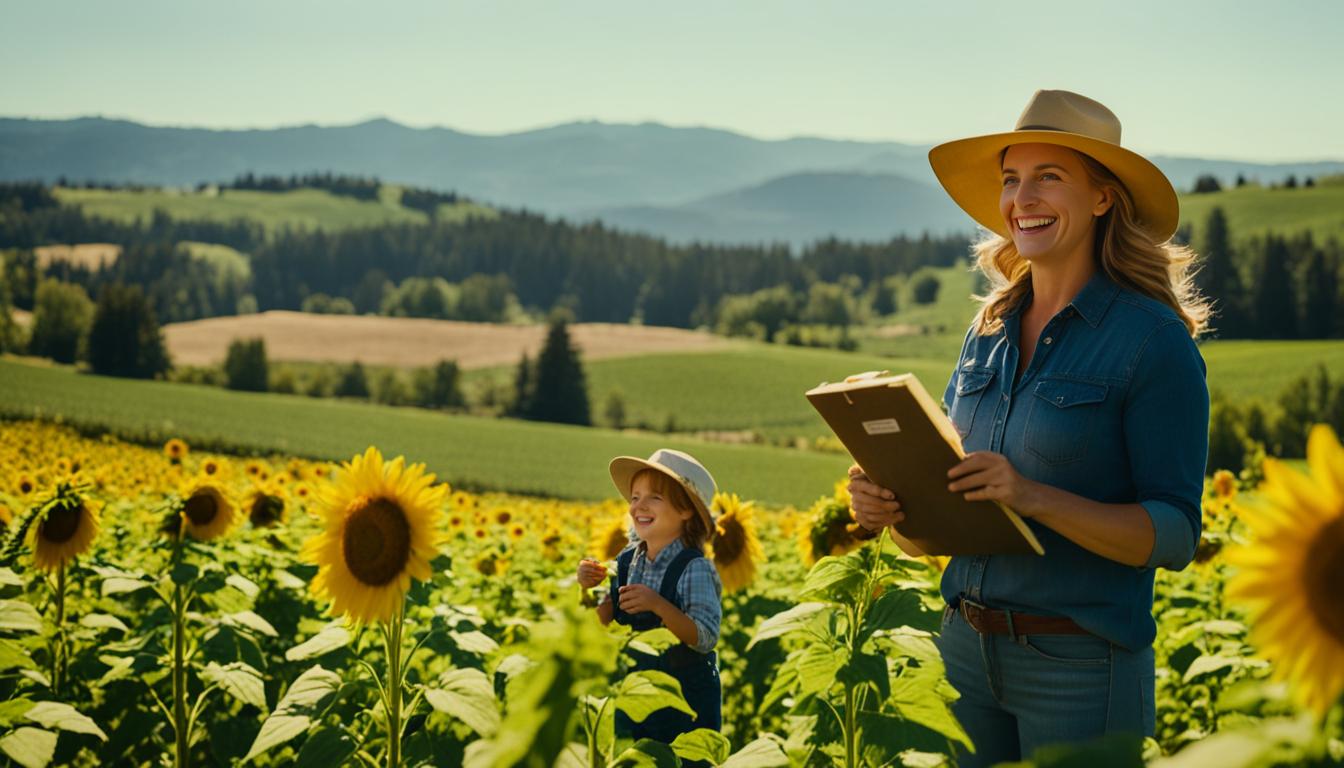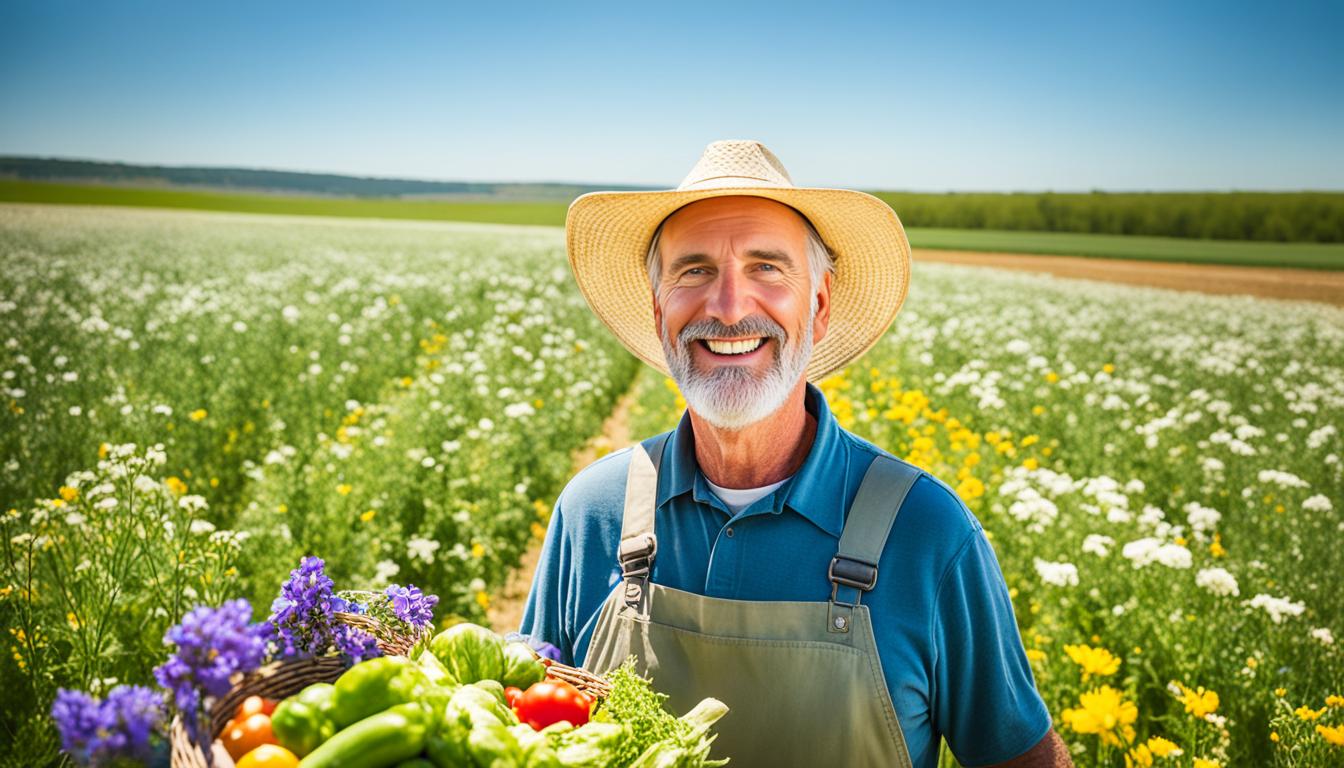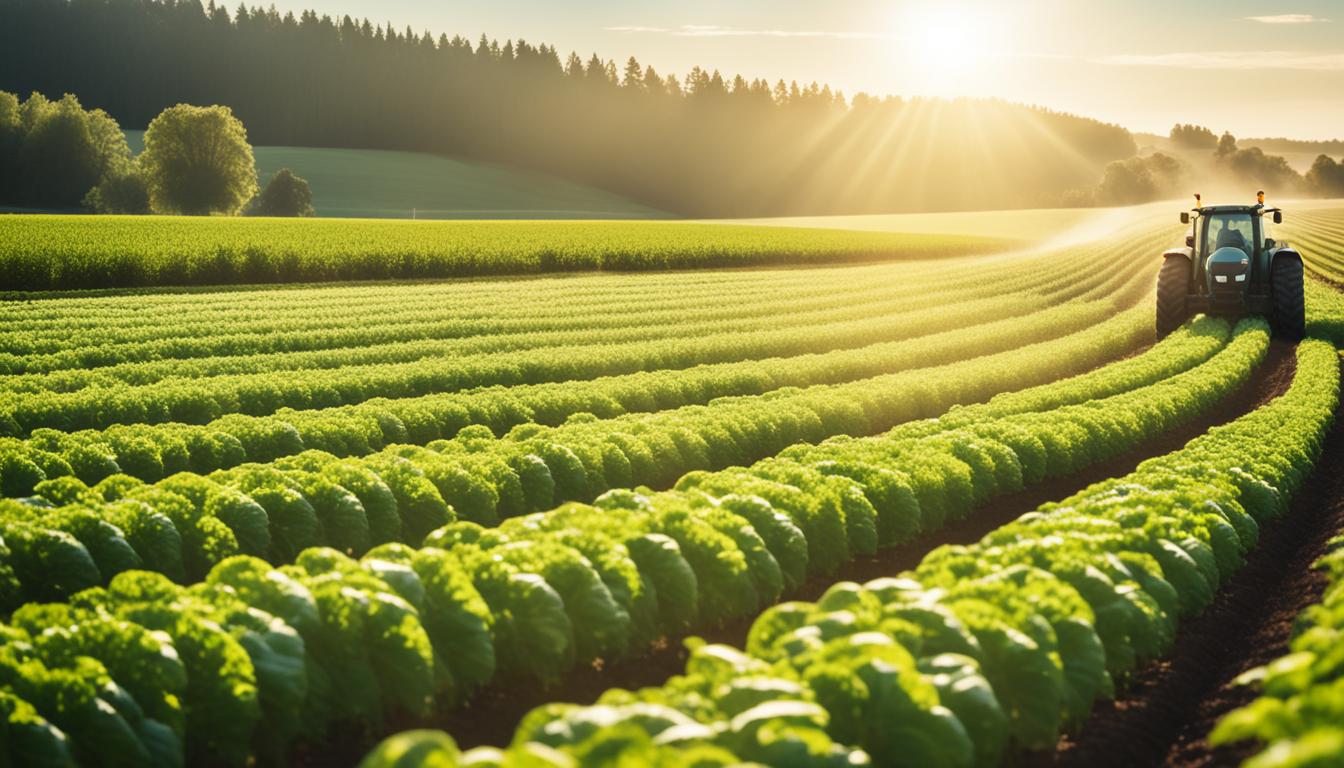Organic farming is key to a sustainable future. It’s good for the environment and helps create a healthier future for everyone. This method keeps nature’s balance intact by working with the land and its resources.
Choosing organic means you care about your family’s health and the planet’s future. Organic farming cuts down on soil erosion, makes water cleaner, and reduces harmful chemicals. It’s a way to make sure our resources last for a long time, leading to a healthier world.
Organic farming values nature’s balance deeply. It uses methods that go well with the environment. This keeps the land fertile and strong for the future. Practices like composting and crop rotation help farming and nature work together.
The Importance of Organic Farming
Organic farming is more than a trend; it’s key to a sustainable future. It helps keep nature’s balance and supports eco-friendly practices. These practices are good for our planet and our health.
Preserving Nature’s Balance
Organic farming works with nature, not against it. It doesn’t use synthetic fertilizers or pesticides. Instead, it uses organic farming techniques that feed the soil and support life cycles. This keeps the land’s biodiversity, letting plants and animals flourish.
Promoting Sustainable Practices
- Organic farmers focus on organic soil management like composting and crop rotation. These methods add nutrients and improve soil structure.
- They use organic pest control methods that don’t harm good insects and wildlife. This keeps the ecosystem balanced.
- By skipping synthetic chemicals, organic farming lowers pollution risks. It keeps our air, water, and soil clean.
“Organic farming is not just about the food we eat; it’s about the health of our planet and the well-being of future generations.”
Organic farming shows us how to live sustainably. It’s a way to work with nature for a better future for everyone.
Organic Farming Techniques
Organic farming is more than just skipping synthetic pesticides and fertilizers. It’s a whole approach to farming that uses nature’s ways. At its core are methods like organic crop rotation, organic pest control methods, and organic soil management practices.
Crop rotation is key in organic farming. By planting different crops in the same field over time, farmers make the soil richer, control weeds, and stop pests and diseases. This approach mirrors nature, making farming stronger and more sustainable.
Organic farmers also use natural pest control methods to fight off pests and diseases. They don’t use chemical sprays. Instead, they use helpful insects, natural repellents, and barriers. These methods protect crops and the environment, and they keep farmers healthy.
Organic soil management is vital for keeping the land fertile and productive over time. Organic farmers focus on creating healthy soil with composting and mulching. They also use cover cropping and green manures to add nutrients and prevent soil erosion.
“Organic farming is not just a method of production, but a way of life that respects the delicate balance of nature and the health of our planet.” – Jane Doe, Sustainable Agriculture Specialist
By using these organic farming methods, growers create a balanced and strong farming system. This system helps the environment, the community, and the people who eat the food grown this way.
Environmental Benefits of Organic Farming
Organic farming is good for our health and the planet. It uses sustainable farming practices. This helps keep our ecosystems balanced and supports a healthier planet.
Reduced Soil Erosion
Organic farming is great at preventing soil erosion. Farmers use cover crops, crop rotation, and less tillage. This keeps the soil in place and stops the loss of nutrients. It also stops sediment from flowing into waterways.
Improved Water Quality
Organic farming also makes our water cleaner. It cuts down on synthetic fertilizers and pesticides. This means less pollution in our water sources. It keeps our water safe for us and protects aquatic life.
Organic farming is all about taking care of our planet. As more people choose organic products, we’ll see more benefits. It’s key to a sustainable future.
Health Benefits of Organic Produce
Choosing organic food over conventional options is good for your health. Organic farming grows nutrient-rich foods with fewer synthetic chemicals. This means less pesticides and additives.
Nutrient-Rich Foods
Organic farming helps soil and plants grow naturally. This makes organic fruits and veggies more nutritious. They often have more vitamins, minerals, and antioxidants like vitamin C and iron.
Reduced Exposure to Harmful Chemicals
Organic farming cuts down on harmful chemicals like pesticides. These chemicals can harm your health, causing problems with hormones and even cancer. Organic farming says no to these chemicals, making sure your food is safe.
“Organic farming is a sustainable approach that prioritizes the health of both people and the planet.”
When you pick organic produce, you know your family is eating food that’s good for you. It’s free from chemicals, supporting your health and well-being.
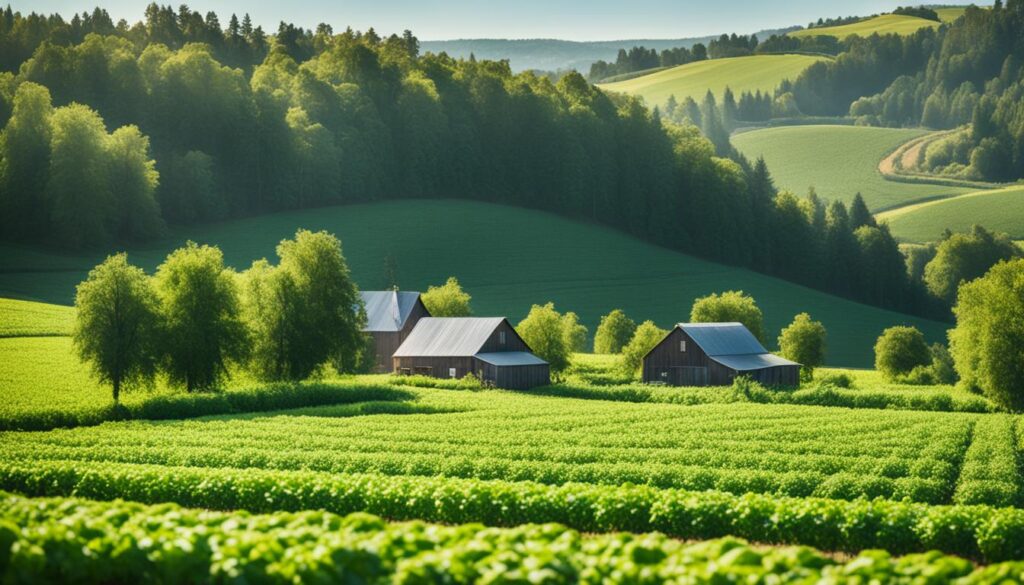
Why Are Organic Farming Important
Organic farming is a way to grow food that’s good for the planet and our health. It uses natural methods instead of synthetic ones. This helps keep our ecosystems balanced and supports a sustainable future.
Organic farming protects the environment by avoiding harmful pesticides and synthetic fertilizers. These chemicals can harm soil, water, and air. Organic farmers use crop rotation, cover cropping, and integrated pest management to keep soil healthy and support many kinds of life.
This approach reduces harm to the environment and keeps the land good for farming in the future.
Organic food is also better for our health because it’s free from chemicals. Studies show organic foods have more vitamins, minerals, and antioxidants than non-organic foods. Eating organic can improve our health and lower the risk of exposure to toxins.
Organic farming also helps local communities and economies. It supports small farms and local food networks. This strengthens rural life and encourages people to buy and eat sustainably.
As more people want organic products, it’s clear organic farming is key to a better food system. By choosing organic, we help make a future that’s good for the earth, our health, and our communities.
Organic Certification Standards
Organic farming and food production follow strict rules. Organic certification checks the quality and realness of organic products. It makes sure what you buy meets organic standards.
Strict Regulations
Getting organic certification is hard work for farmers and producers. They must follow many rules. These rules cover sustainable farming, approved inputs, and no synthetic chemicals. This ensures organic food is good for the earth and healthy for people.
Ensuring Quality and Authenticity
- Organic certification bodies check organic farms and production places. They make sure they follow the rules.
- These certifications say no to GMOs, synthetic pesticides, and other non-organic stuff. This keeps organic food pure.
- Meeting these tough organic certification rules shows farmers and producers care about sustainable and fair practices. This builds trust with consumers about the quality and realness of their organic products.
| Organic Certification Standard | Key Requirements |
|---|---|
| USDA Organic |
|
| Demeter Biodynamic |
|
| Organic Trade Association (OTA) |
|
By following these strict organic certification rules, farmers and producers make sure their organic products are top quality and real. This lets consumers feel good about their food choices.
Organic Pest Control Methods
In organic farming, keeping pests under control is key to a healthy balance in nature. Unlike traditional methods that use lots of chemicals, organic farmers use eco-friendly ways to protect their crops. This ensures a healthy, full harvest.
One main way organic farmers control pests is by using natural predators. They encourage helpful insects like ladybugs and lacewings to eat pests. This creates a balanced ecosystem that fights off pests naturally.
Another method is crop rotation. By changing what they grow in a spot often, farmers make it hard for pests to survive. This keeps pests away, helps the soil, and makes farming more sustainable.
Organic farmers also use natural pesticides. These come from plants, biological agents, or minerals. They target pests without harming the environment or people.
By using organic pest control methods, farmers show they care about the planet. These methods help protect crops and support sustainable farming practices. They’re key for a future that’s good for the earth.
Organic Soil Management Practices
Healthy, nutrient-rich soil is key to successful organic farming. Organic farmers use sustainable soil management to boost soil fertility and land health. Composting and mulching are two main practices they follow.
Composting and Mulching
Composting turns organic waste like plant and animal matter into a fertilizer. This process replenishes soil with vital nutrients. Mulching uses organic materials like wood chips or straw on the soil surface. It keeps the soil moist, controls weeds, and slowly adds nutrients as it breaks down.
Crop Rotation Techniques
Organic farmers use crop rotation to keep soil healthy and productive. By changing crops seasonally, they prevent nutrient loss, reduce pests and diseases, and improve soil structure. This method helps nutrients cycle naturally and supports diverse plant life.
These practices help organic farmers maintain fertile and resilient land. They contribute to a sustainable future for farming.
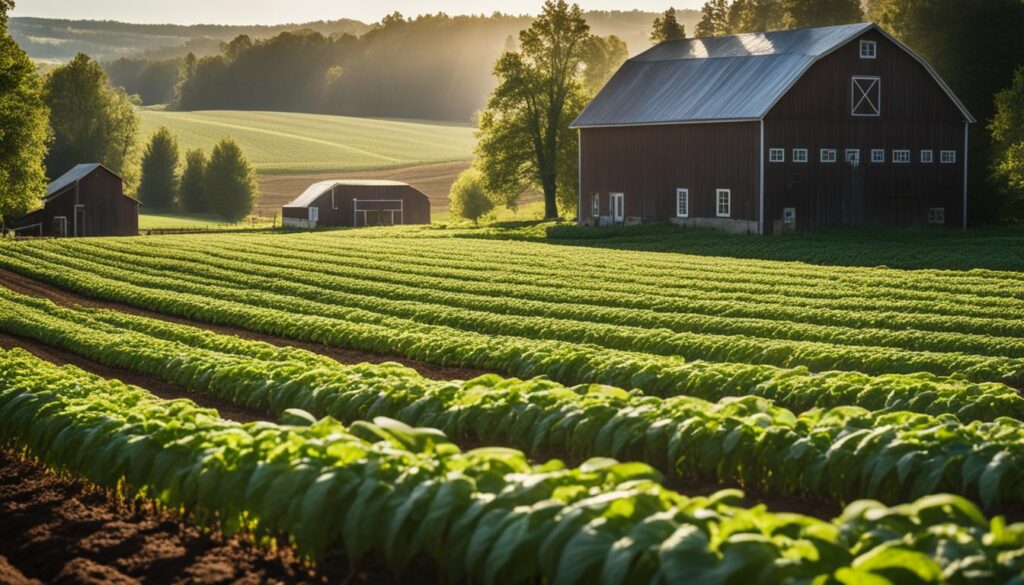
| Organic Soil Management Practice | Benefits |
|---|---|
| Composting | Transforms organic waste into nutrient-rich soil amendment, replenishing essential nutrients. |
| Mulching | Retains soil moisture, suppresses weed growth, and gradually releases nutrients as the mulch decomposes. |
| Crop Rotation | Prevents nutrient depletion, reduces pest and disease buildup, and improves soil structure. |
“Healthy soil is the foundation of a sustainable and productive organic farm.”
Economic Benefits of Organic Farming
Organic farming is becoming more popular as people want organic products more. It’s good for the environment and health, and it can also make farmers more money.
Organic farming can lead to higher prices for produce, grains, and livestock. This means farmers can earn more from their work. This is because more people want to buy organic, sustainably grown food.
| Organic Product | Average Premium Price (%) |
|---|---|
| Organic Produce | 20-30% |
| Organic Grains | 15-25% |
| Organic Meat and Dairy | 25-35% |
Organic farming can also save money in the long run. By making soil healthy, farmers use less synthetic fertilizers and pesticides. This makes farms more profitable and sustainable.
Organic farming lets farmers try new things and make more money. They can sell special products or even host farm tours. This makes their farms more resilient.
“Organic farming is not only good for the environment, but it can also be a profitable and sustainable business model for farmers.”
As more people choose organic and sustainable food, organic farming will keep getting better for farmers. It’s a great way for farmers to make a living and protect the planet.
Challenges Faced by Organic Farmers
Organic farming has many benefits, but it also has its challenges. Organic farmers deal with higher costs and more work. They also struggle to get the right organic inputs.
Higher Costs and Labor Intensity
Switching to organic farming is expensive. Getting certified and using sustainable methods costs more. Also, organic farming needs more work to control pests and manage soil.
At first, farmers might not make as much money. This is because they produce less per acre in the early years.
Limited Access to Organic Inputs
Organic farmers find it hard to get the right organic certification standards-approved products. This includes organic fertilizers, pest control, and seeds. These products are often scarce and pricey.
To help, groups and leaders are offering more support to organic farmers. They’re working on making organic inputs easier to get, offering cost help, and funding research for better organic farming methods. This will help organic farming grow and give people quality, eco-friendly food.
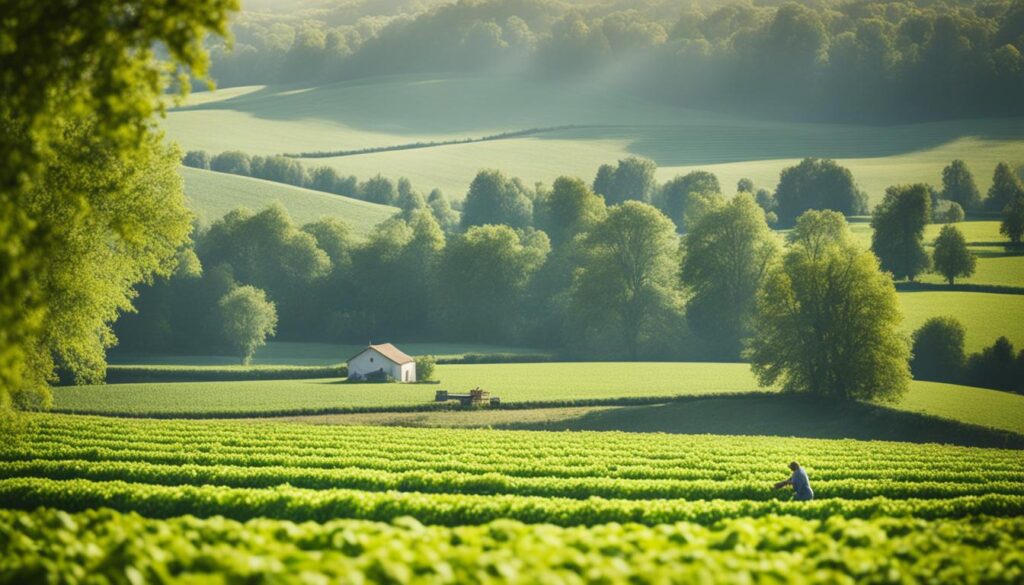
The Future of Organic Farming
More people are learning about the good things about organic farming, making its future look bright. The need for organic products is going up because people want food that is good for them and the planet. New technology is changing how organic farming works, making it more efficient and big-scale.
Increasing Consumer Demand
Organic farming is getting more popular as people look for organic food, like fruits, vegetables, and dairy. This is because they know organic food has fewer chemicals, is healthier, and helps the environment. As more people choose organic, the market for these products is expected to grow a lot.
Technological Advancements
New tech is making organic farming better and bigger. Things like precision farming and better soil tools help farmers grow more food with less waste. Also, new ways to fight pests and sustainable farming methods are solving old problems.
The organic farming world is changing fast. With more people wanting organic food and new tech, the future looks bright. This means a healthier planet and better food for everyone.
Organic Farming and Sustainability
Organic farming is key to sustainable practices and reducing agriculture’s environmental impact. It focuses on the long-term health of natural resources, biodiversity, and ecosystems. This approach ensures the land stays healthy for the future.
Organic farming respects nature’s balance. It avoids synthetic fertilizers and pesticides. This keeps the soil, water, and air clean. It also produces food that is nutritious and free from harmful additives.
| Sustainable Farming Practices | Environmental Impact of Organic Farming | Benefits of Organic Agriculture |
|---|---|---|
|
|
|
Organic farming is crucial for protecting the environment and ensuring a healthy future. It helps keep nature in balance. This leads to a sustainable food system that benefits the land and people who live off it.
“Organic farming is not just about growing food; it’s about growing a better future for all of us.”
Supporting Local Organic Farmers
Supporting organic farming helps your community and the planet. Joining community-supported agriculture (CSA) programs is a great way to do this. CSAs link you with local organic farmers, giving you fresh produce and a closer bond to the earth and those who grow your food.
Community Supported Agriculture
Being a CSA member means you’re a part of a local farm. You get a box of organic fruits, veggies, and other fresh items every week or two. This helps organic farmers earn a steady income and grow food sustainably. By joining, you support your local farmers and enjoy the perks of organic farming.
Farmers’ Markets and Co-ops
Shopping at farmers’ markets and food co-ops is another way to back organic farming. These places let organic farmers sell their produce directly to you. Buying from them means you get the best organic food and help build a strong, sustainable food system in your area.
| Benefits of Supporting Local Organic Farmers |
|---|
|
Supporting local organic farmers brings many benefits to our food system. Start by checking out CSA programs, visiting farmers’ markets, and joining the organic food movement. Together, we can make a difference.
Conclusion
Organic farming is key to a sustainable future. By choosing organic agriculture benefits, you help keep nature in balance. You also support eco-friendly practices and improve health in your community.
The importance of organic farming goes beyond just eating healthy food. It’s about protecting our natural resources and cutting down on carbon emissions. By picking organic, you make a big difference for the whole ecosystem.
You have the power to change our food system’s future. Supporting organic farmers and living an organic lifestyle makes a big difference. Let’s celebrate the good things about organic farming together. Let’s work towards a greener, healthier, and stronger world for everyone.
